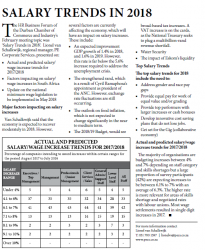
Salary Trends In 2018
‹ Back
Salary Trends In 2018
2018-02-25
The HR Business Forum of the Durban Chamber of Commerce and Industry's February meeting topic was
‘Salary Trends in 2018’. Lionel van Schalkwijk, regional manager, PE Corporate Services, presented on:
-
Actual and predicted salary/wage increase trends for 2017/2018
-
Factors impacting on salary/wage increases in South Africa
-
Update on the national minimum wage legislation to be implemented in May 2018
Major factors impacting on salary increases
Van Schalkwijk said that the economy is expected to recover moderately in 2018. However, several factors are currently affecting the economy, which will have an impact on salary increases. These include:
-
An expected improvement GDP growth of 1.4% in 2018, and 1.6% in 2019. However, this rate is far below the 5.6% increase required to address the unemployment crisis.
-
The strengthened rand, which is a result of Cyril Ramaphosa’s appointment as president of the ANC. However, exchange rate fluctuations are still occurring.
-
The outlook on food inflation, which is not expected to change significantly in the near to medium term.
-
The 2018/19 Budget, would see broad-based tax increases. A VAT increase is on the cards, as the National Treasury seeks to plug a multibillion-rand revenue shortfall.
-
Water Security
-
The impact of Eskom’s liquidity
Top Salary Trends
The top salary trends for 2018 include the need to:
-
Address gender and race pay gaps
-
Provide equal pay for work of equal value and/or grading
-
Provide top performers with larger increases or cash bonuses
-
Develop innovative cost saving plans that do not lose jobs.
-
Get set for the Gig (collaborative economy)
Actual and predicted salary/wage increase trends for 2017/2018
The majority of organisations are budgeting increases between 4% and 7% depending on staff category and skills shortages but a large proportion of survey participants (42%) are expecting increases to be between 6.1% to 7% with an average of 6.3%. The higher rate is more relevant for areas of skills shortage and negotiated rates with labour unions. Most wage settlements resulted in single digit increases in 2017.
For more information contact Lionel van Schalkwijk
T: 031 700 1597 |
lionelvs@pecs.co.za
www.pecs.co.za
